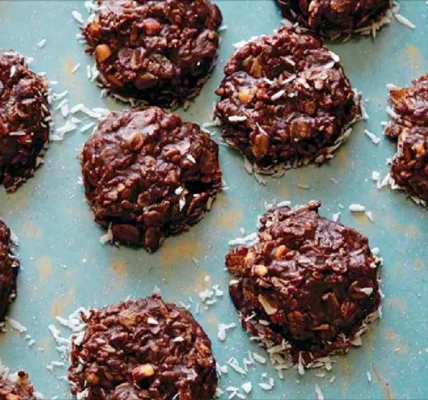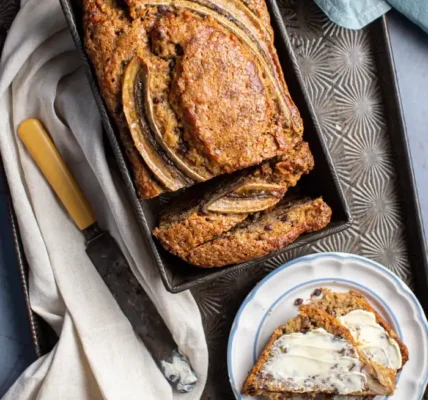These buttery shortbread thumbprint cookies are flavored with almond, filled with cherry jam, and drizzled with a simple icing. Add these festive cookies into your holiday cookie tin!

Overview
- Skill Level: Beginner
- Technique Used: Creaming Method for Cookies
- Component Used: Powdered Sugar Icing
Classic shortbread cookies are one of my favorite cookies ever. It always amazes me how a few simple ingredients can make something so delicious.
To make these thumbprint cookies, I’m elevating my shortbread recipe by adding a fruity jam, a bit of almond flavor, and a sweet but simple glaze.
You can use any flavor of jam that you like for these cookies. Raspberry jam is a classic flavor but I prefer cherry. I think cherry and almond are a flavor match made in heaven!
Why I love these shortbread thumbprint cookies
- Simplicity! While there are 3 components to this recipe (the dough, the jam, and the glaze) all 3 are very simple with few ingredients.
- Customizable! If you don’t enjoy cherry and almond flavor, mix it up! Swap out the jam for any flavor you want and either omit or swap out the almond flavor.
- So pretty! The bright color of the jam and the beautiful crisp white of the glaze is so beautiful. Imagine how wonderful these would look in a cookie tin.
- Perfect for any season! While I originally wrote this recipe to include in my 25 Days of Christmas Cookies series, this cookie can be made any time of year. Swap in seasonal flavors however you’d like.
How to make Shortbread Thumbprint Cookies
Step 1: Make the Shortbread Cookie Dough
The cookie dough for these thumbprint cookies is a shortbread cookie dough. This means that it is very buttery, slightly crumbly, and it doesn’t contain a chemical leavening or eggs.
To mix the sugar and butter together, we are utilizing the creaming method. For this reason, it is very important that the butter is at a soft, room temperature so that it creams up light and fluffy with the sugar.


I decided to add a bit of cornstarch into this recipe because It helps prevent the cookies from spreading and also gives the cookies a more “melt in your mouth” flavor.
This particular dough will be quite thick and a bit crumbly. This is normal. It will hold together when you scoop and roll.
Step 2: Scoop the Cookies and Make Thumbprints


Scoop dough into about 1 tablespoon portions. I use a small cookie scoop to do this but a measuring spoon works as well. You can also simply eyeball it.
Roll the dough balls between your palms to smooth out and then press your thumb into each to create a little thumbprint. I press only about a ½ inch (1.2 cm) down into each cookie. Do not press all the way through the dough ball.
Step 3: Fill with Jam and Bake

Spoon about ½ teaspoon of jam into each thumbprint. I really love cherry jam in these but any flavor will work. Make sure you don’t overfill the cookies or the jam will spill out when baking.
Bake until the cookies are set and only slightly browned. They will stay fairly pale.
Step 4: Glaze

Once the cookies are completely cooled, drizzle with a simple powdered sugar glaze. This step is optional but I think it makes them look really pretty and adds a touch more sweetness.
Storage
Thumbprint cookies can be stored at room temperature or in the refrigerator in an airtight container for 3-4 days.
In my experience, baked thumbprint cookies made with jam don’t freeze very well. I suggest freezing the raw cookie dough instead.
Make-Ahead
If you would like to prepare the dough ahead of time and bake later, make the cookies all the way up to step 4. Place the raw shaped cookie dough balls in a single layer on a sheet pan in the freezer. Once frozen solid, transfer to a zipper bag and freeze for up to 3 months.
When you are ready to bake, transfer to a parchment lined baking sheet and let sit at room temperature for about 30 minutes. Spoon the jam into the thumbprints and bake as directed.
FAQ
How do I keep my thumbprint cookies from spreading?
This cookie dough recipe should only spread a little bit, not much at all. To prevent the cookies from spreading further, place the shaped cookies in the freezer for about 15 minutes before baking. This will firm up the butter and help the outside to set before it melts and spreads in the oven.
Can I make a different flavor?
Yes! This recipe is very customizable. Choose your favorite flavor of jam or preserves like strawberry, blueberry, raspberry, apricot, and orange. The options are limitless. Omit the almond extract in the dough and glaze if you’d prefer or swap in vanilla extract.
Ingredients
- NOTE: A few have commented that the dough is too dry and won’t hold together. It is EXTREMELY important that you either weigh your flour or measure by fluffing it up, lightly spooning it into the measuring cups without packing it down, and level it off. This dough is slightly dry and crumbly but should hold together as you roll into balls. If it doesn’t, see the instructions about adding a bit of milk.
For the Cookies
- 113 grams (½ cup, 1 stick) unsalted butter, room temperature
- 75 grams (6 tablespoons) granulated sugar
- ½ teaspoon almond extract
- ⅛ teaspoon kosher salt
- 10 grams (2 tablespoons) cornstarch
- 150 grams (1 ¼ cups) all-purpose flour
- 70 grams (¼ cup) jam of choice (I used cherry jam)
For the Glaze
- 60 grams (½ cup) powdered sugar
- ⅛ teaspoon almond extract
- 1-2 tablespoons (15-30 ml) milk
Instructions
Prep:
- About 30 minutes before making the dough, take the butter (113 grams/ ½ cup) out of the refrigerator and let come to room temperature. Measure out the rest of the ingredients.
- Position oven racks in the top and bottom thirds of the oven. Preheat the oven to 375°F/190°C. Line two sheet pans with parchment paper or silicone baking mats.
Method:
- In the bowl of a stand mixer fit with the paddle attachment, or a large bowl with a hand mixer, cream the butter, sugar (75 grams/ 6 tablespoons) and almond extract (½ teaspoon) together until light and fluffy about 2-3 minutes on medium-high speed.
- Add the salt (⅛ teaspoon) cornstarch (10 grams/ 2 tablespoons) into the bowl and mix until evenly distributed. Add the flour (150 grams/ 1 ¼ cups) into the bowl and mix until incorporated. The dough will be crumbly and will not completely come together. But it should hold together as you scoop and roll them into balls. If it isn’t holding when you try to scoop them, add 1-2 tablespoons of milk or water to the dough until it can hold shape when pressed together.
- Scoop the dough into 1 tablespoon portions (I use this cookie scoop), roll into smooth balls and place on the parchment lined baking sheets. The warmth of your hand and light pressure will help the dough come together. Press your thumb into each ball about halfway down.
- Spoon about ½ teaspoon of jam into each thumbprint.
- As an optional step, place the tray into the freezer for about 15 minutes before baking. This helps them really not spread out in the oven, but is optional.
- Bake for 9-12 minutes until very lightly browned and set. They will stay very pale.
- Cool for about 5 minutes before moving to a cooling rack to cool completely before drizzling with the glaze.
- For the Glaze: Whisk the powdered sugar (60 grams/ ½ cup) together with the almond extract (⅛ teaspoon) and enough milk (about 1-2 tablespoons) to make a glaze that can be drizzled. Drizzle over each cookie. You can place the glaze in a ziplock back and cut the tip off to create a tidy drizzle.
- Store in an airtight container at room temperature or in the refrigerator for 3-4 days.
Don’t miss a recipe!
Sign up to get weekly emails with recipes, tips & techniques, and food science directly in your inbox!




